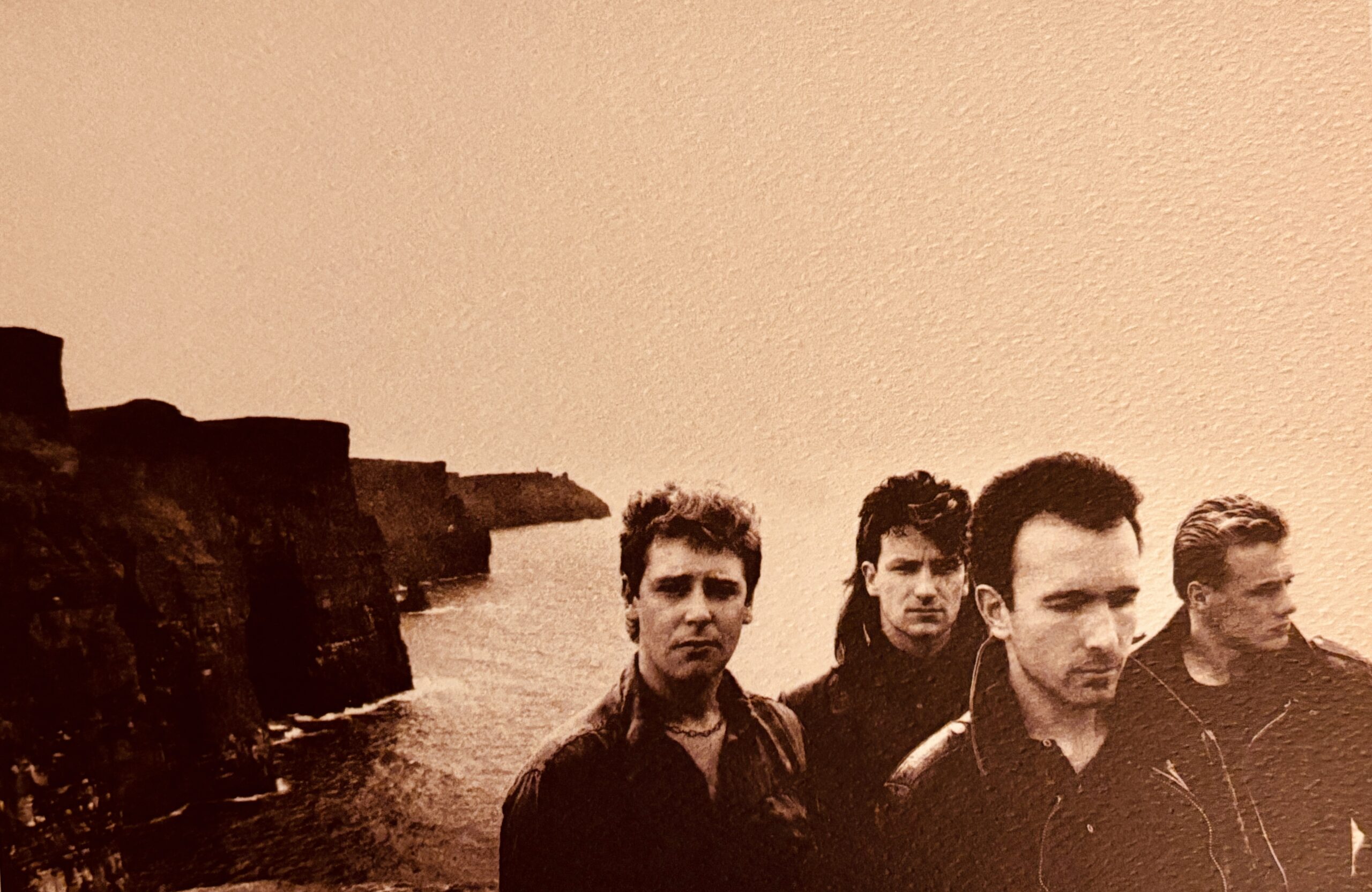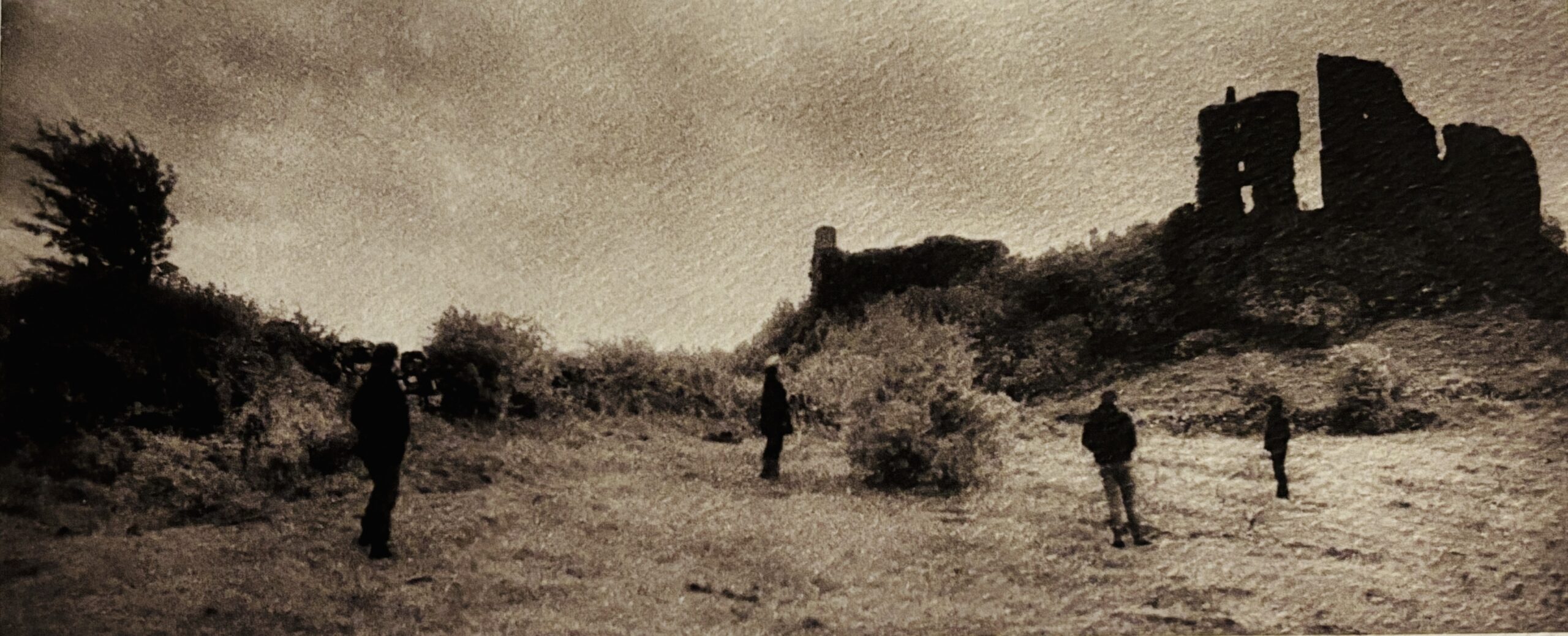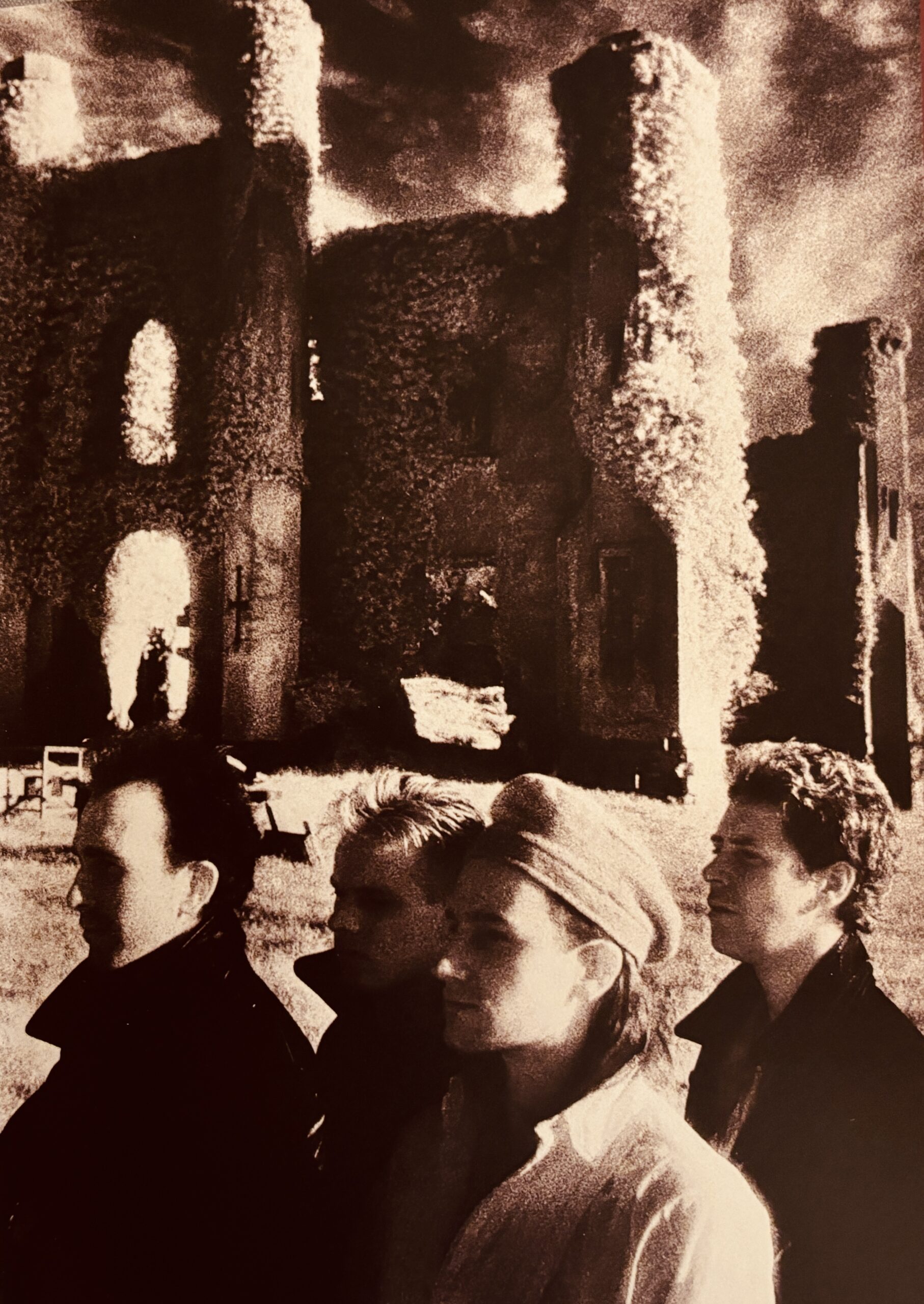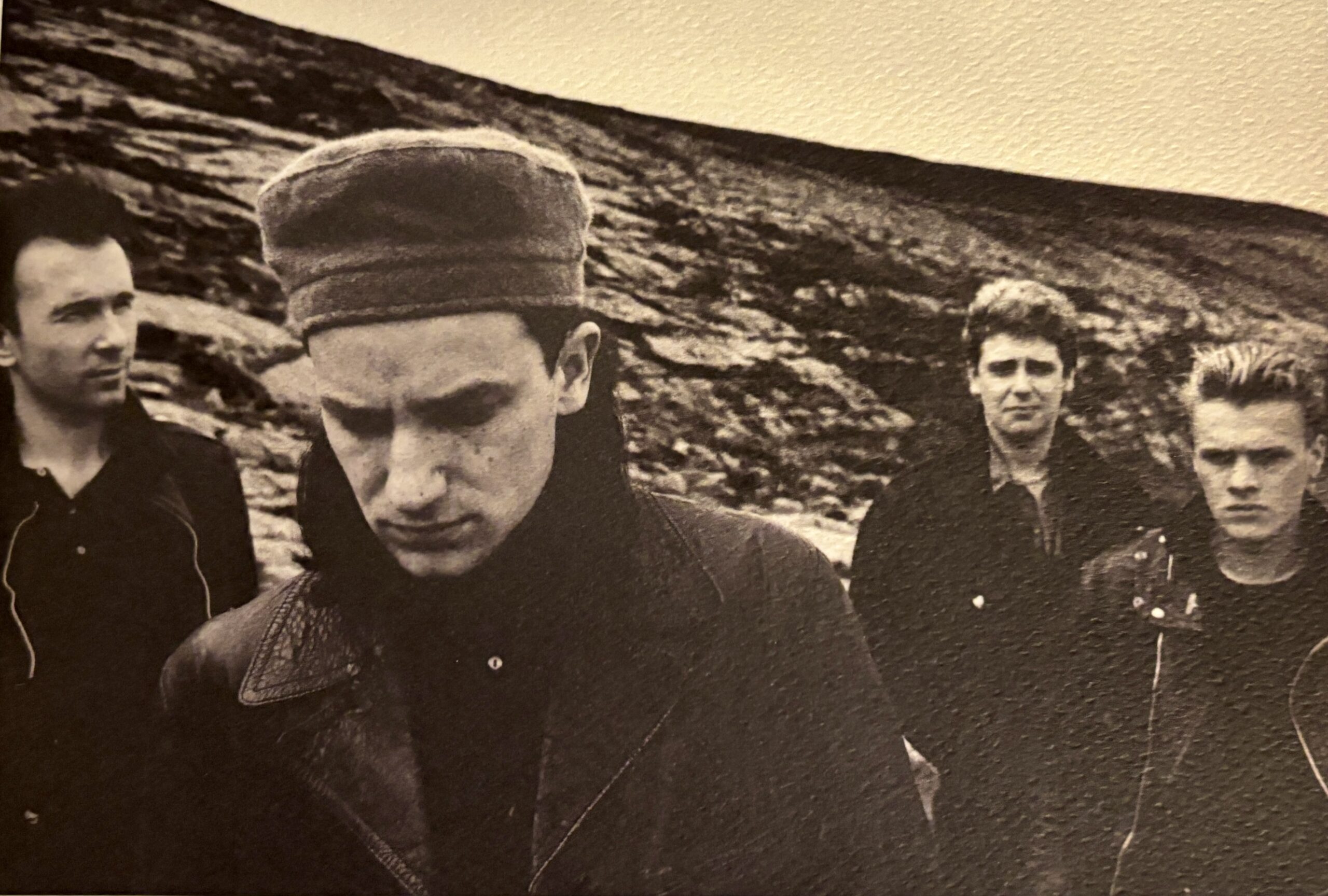U2’s earnest, anthemic sound had fueled their rise for four years, starting with their 1980 debut album Boy. But by 1984, the formula risked becoming stale. Three studio albums, including the breakout hit War, and a live album propelled by heavy MTV airplay, had brought them to a crossroads. As Niall Stokes recounts in the 25th-anniversary box set of The Unforgettable Fire, “Bono declared their Phoenix Park gig in Dublin the final chapter for U2 Mark I. Reinvention was necessary. Their next album, he promised, would be a departure.”
While it’s not entirely accurate to say that The Unforgettable Fire was completely different, the record was a conscious departure from what came before. Indeed, to grow as a band, the group chose to pair themselves with a producer whose work in the early ‘80s was either working with Talking Heads or producing ethereal ambient instrumental records. How on earth would a loud, self-righteous, unironic band meld with a technocratic, ironic, and musically laconic producer to create an album that wouldn’t completely flush the fans who had been with the band since the get-go? The answer to that conundrum centered on two factors: 1. No minor chords would be on the record (except, it seems, when absolutely needed), and 2. Co-producer Daniel Lanois would be part of the team. That last bit was integral to bringing in musical ideas for some of the band members, while Eno’s penchant for tone and texture would layer in atmospherics to give the songs unique sonic underpinnings that expanded their sonic arsenal in new, interesting, but not always successful ways.
The late Popdose writer Ken Shane said in 2009, “The Unforgettable Fire is an important album in U2’s progression from Dublin punks to stadium-filling megastars. It’s on this album that they found the sound that would propel them to the stratosphere.” Ken is correct in that assessment. But at the time of its album release writers like Kurt Loder at Rolling Stone (and later MTV) noted, “U2 flickers and nearly fades, its fire blanked by a misconceived production strategy and occasional interludes of soggy, songless self-indulgence. This is not a “bad” album, but neither is it the irrefutable beauty the band’s fans anticipated.” Although, both Ken Shane and Kurt Loder had different opinions of the album, they both hit on its strengths and weaknesses. The Unforgettable Fire is an important album in U2 progression, and it does get bogged down in soggy, songless self-indulgence. However, working with Eno and Lanois was the kick-the-ass that U2 needed – and wanted. Unless you’re AC/DC, most bands want their sound to progress. They want to innovate, experiment, and depart from what’s expected. That’s what makes art interesting and exciting. U2 had enough of what was expected and sought to grow as musicians. Eno and Lanois did help them do that through various suggestions, which didn’t always work. But it was worth the risk since U2 was done (for the moment) at being a slogan-shouting band.
In Bono’s autobiography, he wrote, “We used to talk about the three primary colors of rock ‘n’ roll – bass, drums, guitar – but there are times when that palette feels limited and you want to stretch what possible from a combo like U2.” Lanois was the one who suggested to Larry Mullen Jr. to turn his snare off and add timbales to his kit. Did it work? In short, yes. Dave “The Edge” Evans, developed his signature chicken scratch guitar sound, but being trapped by it on song after song was probably frustrating. Eno, helped him elevate his playing to include more harmonics, textural landscapes, and accents that could be layered on top of a tasty riff…um, excuse me, a “guitar figure” (in Eno’s words). You can hear it throughout the album. Adam Clayton’s bass playing also got a much-needed shove, which is front and center on the album opener, “A Sort of Homecoming.” Lyrically, Bono also became a more confident and interesting lyricist with some songs venturing into Lou Reed territory. Although The Unforgettable Fire was a reinvention album, it still retains a core U2 sound on many songs. Looking back from the perch of 2024, one can say it was a genius move to embrace the needed experimentation to grow as musicians. Time has also shown that whatever the album’s shortcomings, The Unforgettable Fire is nothing if not a major career gamble that would have either tanked or set back the band’s career were it not for the perennial favorite “Pride (In The Name of Love),” “Bad,” the title track, and “A Sort of Homecoming” – even with its unconventional song structure. Without those songs, The Unforgettable Fire is a bit of a meandering mess. However, the band and its production team chose art over commerce when making this album. As an artistic departure from the band’s core sound, it was and is exciting to hear a band like this take such a big risk. It’s hard to say for sure, but one thing’s clear: without The Unforgettable Fire’s audacious turn, U2 might never have embraced the sonic experimentation that defined their 90s era, with all its triumphs and stumbles. That’s the beauty (and risk) of artistic evolution. If you crave comfort and predictability, well, there’s always adult contemporary music.
Track by track:
“A Sort of Homecoming” – Album openers are often the salvo that sets the tone for what’s to come, and U2 does that on this sonically trippy song. Larry Mullen’s drums don’t crack like expected but rather have a dark tonality with unexpected patterns. The Edge is all texture with unique stabs – even when introducing his signature riff. Adam Clayton’s bass work is close to perfect with the instrument almost becoming like a lead instrument. Bono’s lyrics are excellent with the use of imagery and narrative. And the choice not to have a big, fist-pumping chorus signaled that U2 was stepping out of its comfort zone, and asking fans to come along for the ride.
“Pride (In the Name of Love)” – If “A Sort of Homecoming” set the tone for what was to come for the album, “Pride” is, alas, a safe throwback where the band hedges its bets. The band undoubtedly knew they needed a hit to make their experiment worth it, so back to the well of earnestness Bono and the band went to craft a wonderfully anthemic song to remind listeners and fans that they had not completely abandoned their beliefs, nor had they ditched their heroes.
“Wire” – This song shows that when you’re not chasing hits, you can write a powerfully crafted deep cut that can also become a fan favorite. When the band performed this on The Unforgettable Fire Tour in 1984, the audience was transfixed by not only the passion of Bono’s vocal performance but also the low end of the bass that rumbled the auditorium with such an intensity that by the time Bono was finished singing “I’m no dope, I’ll give you hope/ Here’s the rope/ Here’s the rope, Now swing on it” the audience erupted with a kind of rapturous reaction that was close to transformative – or at least that’s what I experience when I saw the band on December 15, 1984 in San Francisco.
“The Unforgettable Fire” – The song begins with some effective harmonics from The Edge, but then transitions into a less adventurous and more standard structure. Though the top layer is conventional, the middle layers include some intriguing sounds that make the song almost cinematic in feel.
“Promenade” – Lyrically, this is where Bono is branching out into Lou Reed territory. The fractured structure fit nicely with the atmospheric and spare music. It appears to be a love song, and since Bono wrote the lyrics, it’s most likely about his wife, Alison Hewson.
“4th of July” – Here’s where The Unforgettable Fire starts to get bogged down. If you had the vinyl (or cassette), “4th of July” started on side two of the record. It’s an instrumental that seems more about exploring sounds, tones, and feel rather than taking the listener on a journey. While it’s only 2:11, it feels overlong and plodding.
“Bad” – So, how do you write a song about heroin and losing your childhood friends to it? U2 tackled this heavy theme with “Bad,” a fan favorite. Bono himself admits the lyrics weren’t fully fleshed out, but Brian Eno loved it as is. And you know what? Eno might have been onto something. Sometimes, leaving lyrics open-ended can build a more intense atmosphere, especially in that epic “Rideout” section. Even The Edge agrees – Bono wanted to rewrite it, but Edge thinks the lyrics on “Bad” are some of Bono’s strongest. And here’s the kicker: despite clocking in at over 6 minutes, the song never feels dragged out.
“Indian Summer Sky” – This song does feel overwrought and overly long because it feels like second-rate U2. Uninspiring, predictable, and lyrically, uninteresting.
“Elvis Presley And America” – This is by far one of the strangest songs on the record. Bono sounds like he’s singing scratch lyrics (maybe because he is), and the music feels like it’s a jam session that needs more development. Eno said that he was completely exhausted after making The Unforgettable Fire, and “Elvis Presley And America” reflects that fatigue. There may be lyrical gold somewhere in Bono’s musing, but it would take a fully awake and engaged Eno to find it and mold it into something far more substantial than what U2 has done here.
“MLK” – The Unforgettable Fire might not be U2’s most cohesive album, but “MLK” as a closer feels like a welcome relief after the unevenness of the preceding tracks. Even with Eno and Lanois pushing for a less preachy sound, Martin Luther King Jr. was an inspiration too important for U2 to ignore. The fight for justice remained a core theme for the band throughout its career, and was made unambiguously plain in Bono’s passionate vocal delivery (think spiritual, not preachy) on “MLK.”










Comments